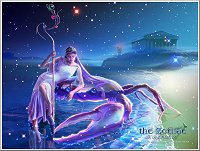CANCER - The Crab
June 22- July 22
SYMBOL - The Crab
ELEMENT - Water
QUALITY - Cardinal
RULING HOUSE - Fourth
PLANET - Moon
QUALITIES
Sensitive
Dependable
Shrewd
Romantic
Magnanimous
Patriotic
Creative
Protective
LUCKY COLOUR - Silver
LUCKY STONE - Pearl
LUCKY DAY - Monday
LUCKY NUMBER - Two

Hercules vs. Hydra
by KEN BARTHELMAY
CLICK TO ENLARGE

Hercules vs. Hydra
fresco at Palazzo Vecchio
CLICK TO ENLARGE

Gemini
By KAGAYA
CLICK TO ENLARGE

Cancer - The Crab
CLICK TO
ENLARGE
Cancer,
the fourth sign of the zodiac, is all about home. Those
born under this sign are 'roots' kinds of people, and
take great pleasure in the comforts of home and family.
Cancers are maternal, domestic and love to nurture
others. More than likely, their family will be large,
too -- the more, the merrier!
Cancers will certainly be merry if their home life is
serene and harmonious. Traditions are upheld with great
zest in a Cancer's household, since these folks prize
family history and love communal activities.
They also tend to be patriotic, waving the flag whenever
possible. A Cancer's good memory is the basis for
stories told around the dinner table, and don't be
surprised if these folks get emotional about things.
Those born under this sign wear their heart on their
sleeve, which is just fine by them. The mascot of Cancer
is the Crab, and, much like this shelled little critter,
Cancers are quick to retreat into their shells if it
suits their mood. No wonder these folks are called
crabby!
For Cancer it's not that big of a deal, though, since
they consider this 'shell' second home (and they
do love home). The flip side of this hiding is that
shell-bound Crabs are often quite moody.
(c) astrology.com |
|
The Lernaean Hydra was the offspring of the horrible monsters
called Typhon and Echidna, who themselves were children of Gaea
(Mother Earth).
The abominable Hydra was brought up under the patronage of Hera, Queen of the Olympians,
who was "grooming" her to kill the great hero
Hercules, who was tasked with slaying it as his second of twelve
labors.
Hera hated Hercules ever since he was born. Her husband Zeus,
King of the Olympians, had a nasty habit of consorting with
countless beautiful young mortal women, and Hercules was his
love child from one of those extramarital affairs.
Hera in wrath had made it her life mission to eternally torment
Hercules. Actually, she hated him even before he was born!
Listen to this:
Hera, patroness of midwives and childbirth, had purposely
delayed the birth of Hercules by four hours so that his cousin
Eurystheus, whose own birth she hastened by two months, would be
born first.
Hera did this by squatting cross-legged at the threshold of the
birthing room, preventing Alcmene from delivering baby Hercules.
By so doing it gave the two-month premature baby Eurystheus the
right to claim the royal throne - by virtue of being older -
rather than the rightful heir, Hercules.
Weak and sickly Eurystheus, even though King, could never get
over playing second fiddle to his famous cousin, who was
fearless and built like a god. Eurystheus was small and puny,
and had absolutely no nerve.
But back to the monster:
The foul Hydra lived in a swamp near the well of Anymone and had
completely ravaged the area of Lernaea.
Other poets place her lair at Lake Lerna in the Argolid area.
It was said that beneath the waters of this lake was an entrance
to the grim Underworld, and the Hydra was forever charged with
protecting the entryway so that no unauthorized being entered.
When evil-minded and weak-kneed King Eurystheus ordered Hercules to slay the beast as his second
labor, both the King and Hera were certain that the hero was
being sent to his death.
Gutless King Eurystheus was the exact opposite of his legendary
cousin.
Hercules was so strong and fearless that he had excitedly
strangled two huge venomous python snakes sent by Hera to devour
him when he was just a months-old baby.
He giggled with delight as he merrily squeezed the life out of
the slithery assassins, each writhing helpless and impotent in
his formidable baby hands.
In comparison, his baby brother Iphicles in the adjoining crib
shrieked in terror and soiled his diaper at the sight of his
brother shaking his new toy rattles, the enormous snakes.
As the years passed, Hercules became even more powerful, and
King Eurystheus even more cowardly, and his resentment of his
larger-than-life cousin grew daily.
Hence, when Hera caused Hercules to go mad, and in his
insanity he murdered his own wife and children -
it's a long story! - Eurystheus was delighted to hear that
Apollo's Oracle at Delphi had pronounced that Hercules had only
one option.
In order to purify himself of the heinous crime, and appease the
scandalized gods, Hercules had to perform twelve impossible
labors over the course of twelve years.
Why was King Eurystheus happy? Because it was determined by the
Oracle that Hercules was obligated to perform twelve tasks
chosen by none other than his envious cousin. And King
Eurystheus was determined to make sure that Hercules would not
return alive.
Both he and Hera were certain that Hercules would perish trying
to slay the Lernaean Hydra. Why? Well, Lerna, a fertile and holy
district, was for years terrorized by the Hydra, which had a
monstrous, dog-like body and nine snaky heads.
It was so venomous that its very breath, or even the smell of
its tracks, could kill.
The Hydra, besides being stinky and enormous, had a
scary tendency to grow two heads whenever one of its nine heads was cut off
or smashed.
That's not even to mention that its middle head was immortal!
Every previous hero that had tried to slay the horrible monster had been
promptly dispatched to the Underworld by the beast.
That was the daunting task facing Hercules. Needless to say, the
hero reveled at the challenge! He was born for this!

Now, it must be mentioned that the great Olympian gods Athena,
Hephaestus and Hermes helped Hercules all along, somewhat
counterbalancing Hera's harm. Heracles had consulted wise Athena
on the best way to dispose of the Hydra, and he promptly set her
plan in motion.
The intolerable stench let him know early on that he was
approaching the lair of the Hydra. Arriving at the entrance
guarded by the malodorous monster, he showered the Hydra with
flaming arrows, waking up the enraged beast and forcing it to
emerge from its lair.
Its presence was literally breath-taking. Doing his best to keep
from hurling his lunch from the stench, Hercules grabbed hold of
the monster.
In turn, the Hydra wrapped itself around him, twining tightly
around his feet in an attempt to trip him. Hercules rained down
blows on its head with his awesome club, but for naught. No
sooner was one head crushed, than two more grew in its place!
Never was the cliché "two heads are better than one" more trite
than in this particular instance. Just when it appeared that
things couldn't get much worse, they did.
Hearing the furious sounds of battle, an enormous crab raced
over from the swamp to aid the Hydra, doing its best to make
lunch of the foot of Hercules. The crab bit down hard on the
hero's ankle, and did it ever hurt!
The crab was huge! Sent by Hera to make the fight even more
one-sided, this obnoxious creature completed an admirable
one-two tag team with the Hydra, inequitably ganging up on the
Greek hero.
While Hercules would furiously batter and shatter the Hydra's
venomous heads, the crab would lock its claws around the hero in
an effort to chomp off his foot and leg. As he would swivel to
pummel the crab's pincers, the Hydra would attempt to decapitate
and strangle him, wrapping around Hercules in a crushing vice.
And did she ever reek! That was the worst part!
And so it went, beleaguered Hercules twisting and turning,
trying to inflict maximum damage to his duo of attackers, while
trying to prevent himself from suffering major harm.
The entire time Hercules was trying to keep from passing out
from the noxious fumes emanating from the Hydra.
Well, Hercules finally had enough! Turning his attention
completely to Hera's crab, Hercules probably visualized her face
as he crushed its shell with a succession of thunderous blows.
"Take that, Hera! And that!" Hercules laid the heavy
wood on the crustacean. "You're worse than damn Cancer!"
Poor crab had no chance. 'Why is he calling me Hera?'
it wondered, in the throes of dying...
Hercules had brought along the son of his brother, called
Iolaus, to be his assistant, weapon bearer and charioteer. Upon
smashing the crab to smithereens, he shouted out to Iolaus that
it was barbecue time.
His nephew set a corner of the grove on fire and handed Heracles
a burning branch. To prevent the Hydra from sprouting new heads,
Hercules cleverly seared their roots with the blazing wood,
burning them and thus stopping the flow of blood, and any new
growth.
Eight times he did this, and each time the deafening screams of
the Hydra sounded to the heavens. This was something completely
new to the monster, usually she was the one inflicting horrific
pain.
Hercules saved the best for last. The ninth head of the Hydra
was allegedly deathless, and had to be treated differently.
Using a golden sword given him by the master craftsman god
Hephaestus, Heracles severed the immortal head and immediately
buried it, still hissing, under an unliftable rock.
Did I mention how strong he was?
Next he cut the rancid Hydra carcass into pieces, just to be
safe, and dipped all of his arrows in the reeking gall and bile.
From that point on, a mere nick from these poisoned arrows was
fatal. Hercules had found himself some fine ammunition for his
future labors! The arrows came in handy for him on more than one
occasion during the rest of his labors, courtesy of the Larnaean
Hydra.
Hera as always had to have the last word when it came to
Hercules, win or lose. She rewarded the crab for its faithful
loyalty, even though her pet was savagely brutalized by
Hercules.
Hera honored the Crab by setting its image among the
stars, as the constellation Cancer, making it one of the twelve
signs of the Zodiac, and joining the honored and exalted
Little Animals in a Circle.
And to add injury to insult, that puny punk King Eurystheus
refused to count the successfully completed Labor as one of the
required twelve, calling it unlawful.
"Your nephew Iolaus supplied the fire-brands, Hercules. I'm
afraid I can't count this one, you had help!" he shouted
out from inside his subterranean jar, where he would hide
whenever Hercules returned triumphantly.
Eurystheus was such a jackass!
But Hercules didn't really care. He was too busy melting butter
to go with the huge, heavily-battered King Crab legs he was
serving for dinner.
|







